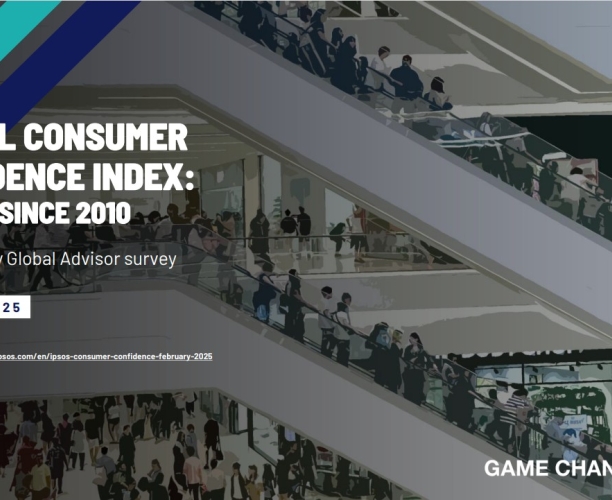The Global Consumer Confidence Index is the average of all surveyed countries’ Overall or “National” indices. This month’s installment is based on a monthly survey of more than 21,000 adults under the age of 75 from 29 countries conducted on Ipsos’ Global Advisor online platform. This survey was fielded between January 24 and February 7, 2025. "Globally, we are seeing some bit of dissonance in geopolitics with new tariffs and priorities, leading to concern and anxiety among Indians. Policy changes in the US on outsourcing of jobs and its impact on the Indian job market is being viewed with concern. With India’s renewed focus on make-in-India and providing a fillip to manufacturing and creation of new jobs, some of these concerns can be addressed. The govt. is also planning to pump in more funds to focus on AI and AI related training, leading to reskilling of the workforce. And then there is this worry around high cost of living impacting household budgets, despite the inflation lowering," stated Amit Adarkar, CEO, Ipsos India. The LSEG-Ipsos PCSI maps consumer sentiment across 4 sub indices. And while the overall sentiment has lowered -2.0 points, sentiment has also weakened for the sub indices. The PCSI Current Personal Financial Conditions sub index (Current Conditions) is down -2.7 percentage points, the PCSI Investment Climate (“Investment”) sub-index has lowered -2.2 percentage points; the PCSI Economic Expectations (“Expectations”) Sub-Index is down -2.4 percentage points; and the sentiment for the PCSI Employment Confidence (“Jobs”) sub-index, has shown a 1.6 percentage points decline.

Consumer sentiment in 29 countries Among the 29 countries, Indonesia (64.2) holds the highest National Index score. It is the only country with a National Index score of 60 or higher.  Ten other countries now show a National Index at or above the 50-point mark: Mexico (59.7), India (58.0), Singapore (57.7), Malaysia (55.6), the U.S. (55.3), Thailand (54.6), Sweden (54.1), the Netherlands (52.3), Argentina (52.0), and Poland (50.0). In contrast, only three countries now show a National Index below the 40-point mark: Japan (37.3), Hungary (35.1), and Türkiye (33.3). Compared to 12 months ago, seven countries show a significant drop in consumer sentiment. In contrast, nine countries show a significant increase from February 2024, most of all in Argentina (+10.4 points). About the StudyThese findings are based on data from a monthly 29-country survey conducted by Ipsos on its Global Advisor online survey platform and, in India, on its IndiaBus platform. They are first reported each month by LSEG as the Primary Consumer Sentiment Index (PCSI). The results are based on interviews with over 21,200 adults aged 18+ in India, 18-74 in Canada, Israel, Malaysia, South Africa, Türkiye, and the United States, 20-74 in Thailand, 21-74 in Indonesia and Singapore, and 16-74 in all other countries. The monthly sample consists of 1,000+ individuals each in Australia, Brazil, Canada, France, Germany, Great Britain, Italy, Japan, Spain, and the U.S., and 500+ individuals in each of Argentina, Belgium, Chile, Colombia, Hungary, Indonesia, Israel, Malaysia, Mexico, the Netherlands, Peru, Poland, Singapore, South Africa, South Korea, Sweden, Thailand, and Türkiye. The sample in India consists of approximately 2,200 individuals of whom 1,800 were interviewed face-to-face and 400 were interviewed online. Samples in Argentina, Australia, Belgium, Canada, France, Germany, Great Britain, Hungary, Italy, Japan, the Netherlands, Poland, South Korea, Spain, Sweden, and the U.S. can be considered representative of their general adult populations under the age of 75. Samples in Brazil, Chile, Colombia, Indonesia, Israel, Malaysia, Mexico, Peru, Singapore, South Africa, Thailand, and Türkiye are more urban, more educated, and/or more affluent than the general population. The survey results for these countries should be viewed as reflecting the views of the more “connected” segment of their populations. India’s sample represents a large subset of its urban population — social economic classes A/B/C in metros and tier 1-3 town classes across all four zones. The data is weighted so that the composition of the sample in each country best reflects the demographic profile of the adult population according to the most recent census data. The global indices and averages reported here reflect the average result for all the countries and markets in which the survey was conducted. They have not been adjusted to the population size of each country or market and are not intended to suggest “total” results. Sample surveys and polls may be subject to other sources of error, including, but not limited to coverage error and measurement error. The precision of Ipsos online surveys is calculated using a Bayesian credibility interval with a survey of N=1,000 being accurate to +/- 3.5 percentage points and a survey of N=500 being accurate to +/- 5.0 percentage points. For more information on credibility intervals, visit this page. The LSEG/Ipsos Primary Consumer Sentiment Index (PCSI), ongoing since 2010, is a monthly survey of consumer attitudes on the current and future state of their local economy, personal financial situation, savings, and confidence to make major investments. The PCSI metrics reported each month for each of the countries surveyed consist of a “Primary Index” based on all 10 questions below and of several “sub-indices” each based on a subset of these 10 questions. The publication of these findings abides by local rules and regulations.
About LSEG LSEG is one of the world’s leading providers of financial markets infrastructure and delivers financial data, analytics, news and index products to more than 40,000 customers in over 170 countries. We help organisations fund innovation, manage risk and create jobs by partnering with customers at every point in the trade lifecycle: from informing their pre-trade decisions and executing trades to raising capital, clearing and optimisation. Backed by more than three centuries of experience, innovative technologies and a team of 25,000 people in over 60 countries, we are driving financial stability, empowering economies and enabling you to grow sustainably.
About Ipsos Ipsos is one of the largest market research and polling companies globally, operating in 90 markets and employing over 20,000 people. Our passionately curious research professionals, analysts and scientists have built unique multi-specialist capabilities that provide true understanding and powerful insights into the actions, opinions and motivations of citizens, consumers, patients, customers or employees. Our 75 solutions are based on primary data from our surveys, social media monitoring, and qualitative or observational techniques. Our tagline "Game Changers" sums up our ambition to help our 5,000 customers move confidently through a rapidly changing world. Founded in France in 1975, Ipsos has been listed on the Euronext Paris since July 1, 1999. The company is part of the SBF 120 and Mid-60 indices and is eligible for the Deferred Settlement Service (SRD).ISIN code FR0000073298, Reuters ISOS.PA, Bloomberg IPS:FP www.ipsos.com. | |







